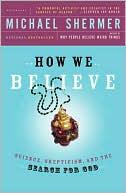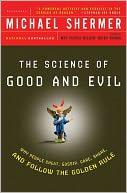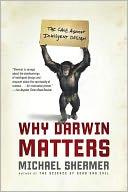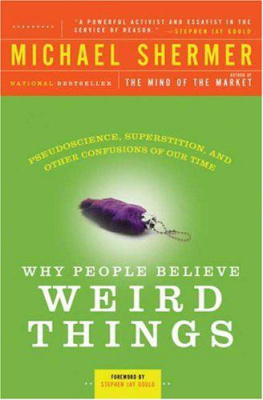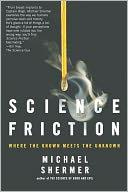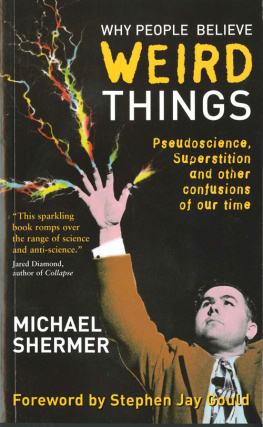This is an important book, which is at the same time a great read. Michael Shermer digs into the American religious psyche with devastating logic and intensity . Too often politeness (or cowardice) prevents people from asking questions or from expressing dissent. No such barriers stand in the way of Shermers acute intellect, the more powerful since he so obviously cares about the issues on which he writes. I love his discussions of God and morality and when I disagree, I simply want to argue the more.
Michael Ruse, author of Taking Darwin Seriously and professor of philosophy and zoology, University of Guelph
Those who approach this intriguing and informative book with a receptive mind will come away with a much deeper appreciation for the wonderful interplay of biology and culture that makes us who we areperhaps unique creatures in the universe.
Donald Johanson, director of the Institute of Human Origins and author of From Lucy to Language
The book will convince and delight all who are not chronically averse to opening their minds and thinking for themselves.
Richard Dawkins, author of Unweaving the Rainbow
The God Question
A Moral Dilemma for Dr. Laura
N ot long after I set out to write this book, I received a fax from a subscriber to the magazine I publish. Skeptic, who had just finished reading the most recent issue (Vol. 5, No. 2) devoted to The God Question. This volume of the magazine addressed the various theological, philosophical, and scientific arguments for Gods existence, Einsteins views on God, skeptic Martin Gardners belief in God, arguments for and against immortality, and the decline of atheism in America. The correspondent, however, was not writing about any specific article, but about the qualifications of one of the members of Skeptics board of advisors. I would love to know what qualifies a person to be on your editorial board, the letter began. If he were interested would Rev. Pat Robertson qualify? I consider myself to be an atheist, a skeptic, and a semiprofessional talk show listener. In the latter capacity I have had many occasions to listen to one Dr. Laura Schlessinger, a member of your board. The letter went on to chronicle Schlessingers reliance on the Bible as her authority for resolving moral dilemmas presented to her by her callers on her radio program. I didnt know that skeptics relied on authority to settle disagreements over morality, the letter concluded.
This was not the first correspondence we received concerning Laura Schlessingers position on our board of advisors. Throughout 1996 and 1997 we were sent a couple of dozen critical letters, faxes, and e-mails, and for a couple of weeks in mid-1997, on a skeptics Internet discussion group, a debate ensued about Schlessingers involvement in the skeptical movement. We explained that membership or involvement in any capacity with the Skeptics Society and Skeptic magazine is not exclusionary. We could not care less what anyones religious beliefs are. In fact, at least two of our more prominent supportersthe comedian and songwriter Steve Allen and the mathematician and essayist Martin Gardnerare believers in God. Other members of the board may believe in God as well. I do not know. I have never asked.
The primary mission of the Skeptics Society and Skeptic magazine is the investigation of science and pseudoscience controversies, and the promotion of critical thinking. We investigate claims that are testable or examinable. If someone says she believes in God based on faith, then we do not have much to say about it. If someone says he believes in God and he can prove it through rational arguments or empirical evidence, then, like Harry Truman, we say show me. Some Christians claim that the Shroud of Turin proves that Jesus lived and was crucified and resurrected. But the shroud was carbon-14 dated and found to be a fourteenth-century hoax (some are now claiming that the dating process was contaminated and that the shroud may be older still, but these claims have never been corroborated in peer-reviewed journals). Some creationists claim that geology proves that the Earth was created only 10,000 years ago. But strict scientific dating techniques show that the Earth is billions of years old. Similarly, some physicists and cosmologists claim that the laws of nature, the configuration of atoms, and the structure of the universe prove it was all created by a supernatural being. But science continues to show that everything from the simplest atoms to the most complex galaxies is explicable by natural laws, historical contingencies, and rules of self-organized complexity.
If, in the process of learning how to think scientifically and critically, someone comes to the conclusion that there is no God, so be itbut it is not our goal to convert believers into nonbelievers. From considerable personal experience I can attest to the futility of trying to either prove or disprove God (see ). In any case, the process would seem inherently impossible since, by admission of nearly all religions, belief in God rests on faith and means suspending the requirements of proof and logic. When people say they believe in God because it comforts them, because they have faith, because of personal revelation, or just because it works for them, I have no qualms with these reasons. But when others say they can prove God, prove that their religion is the right one, prove that we cannot be moral without God, and so forth, such claims demand a scientific and rational analysis. Of course, if the answers to these arguments are as obvious and clear-cut as both theists and atheists think, then why do such debates continue, even in the hallowed halls of theological seminaries and universities, where presumably the question of Gods existence would have been resolved by now? It has not. That fact alone tells us something about the nature of the subject. So, I would have thought that any member of the Skeptics Society would be aware that Gods existence, from a scientific and rational perspective, remains an open questionit cannot be proved one way or the other. But I also would have imagined that Schlessinger, who is both highly intelligent and well educated, would have been equally aware and sensitive to this issue.
For those who may still be unfamiliar with her, Laura Schlessinger, best known as Dr. Laura, is the star and host of the top-rated nationally syndicated radio talk show program, running neck and neck with Rush Limbaugh for the number-one spot. She is in virtually every radio market in America, has millions of listeners, receives on average upwards of 60,000 calls per day, and in 1997 her program was sold for a staggering $71 million. Her books, Ten Stupid Things Women Do to Mess Up Their Lives, Ten Stupid Things Men Do to Mess Up Their Lives, How Could You Do That?, and The Ten Commandments, were all national bestsellers in both hardback and paperback. She draws huge crowds for her speaking engagements. Dr. Laura mugs, T-shirts, and newsletters are promoted daily through the radio program and an ever-growing mailing list of fans. She has been featured on several national newsmagazine and morning programs, and was even satirized in Playboy magazine. This is all to say that Laura Schlessinger is hugely influential. When she speaks, people listen.

